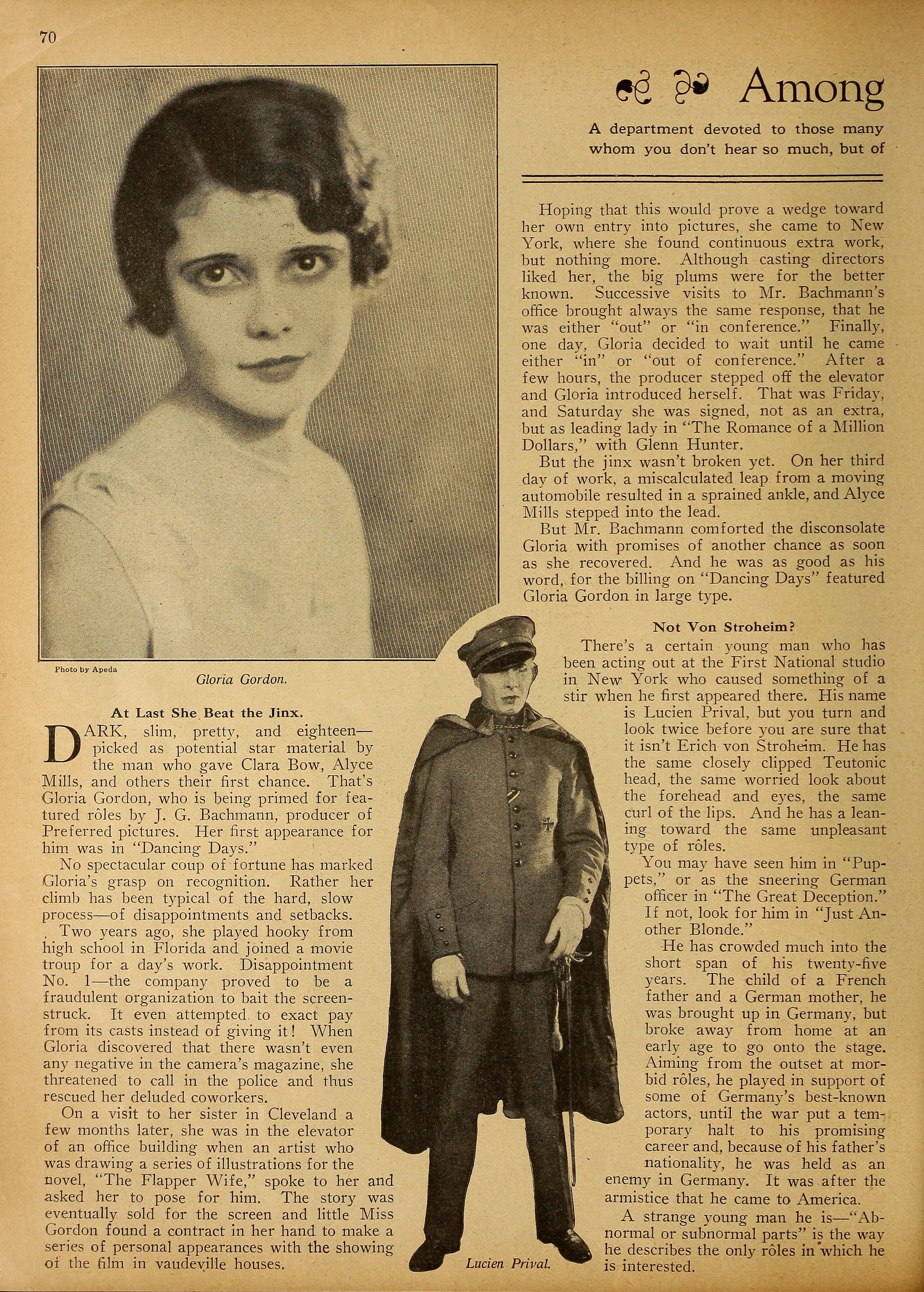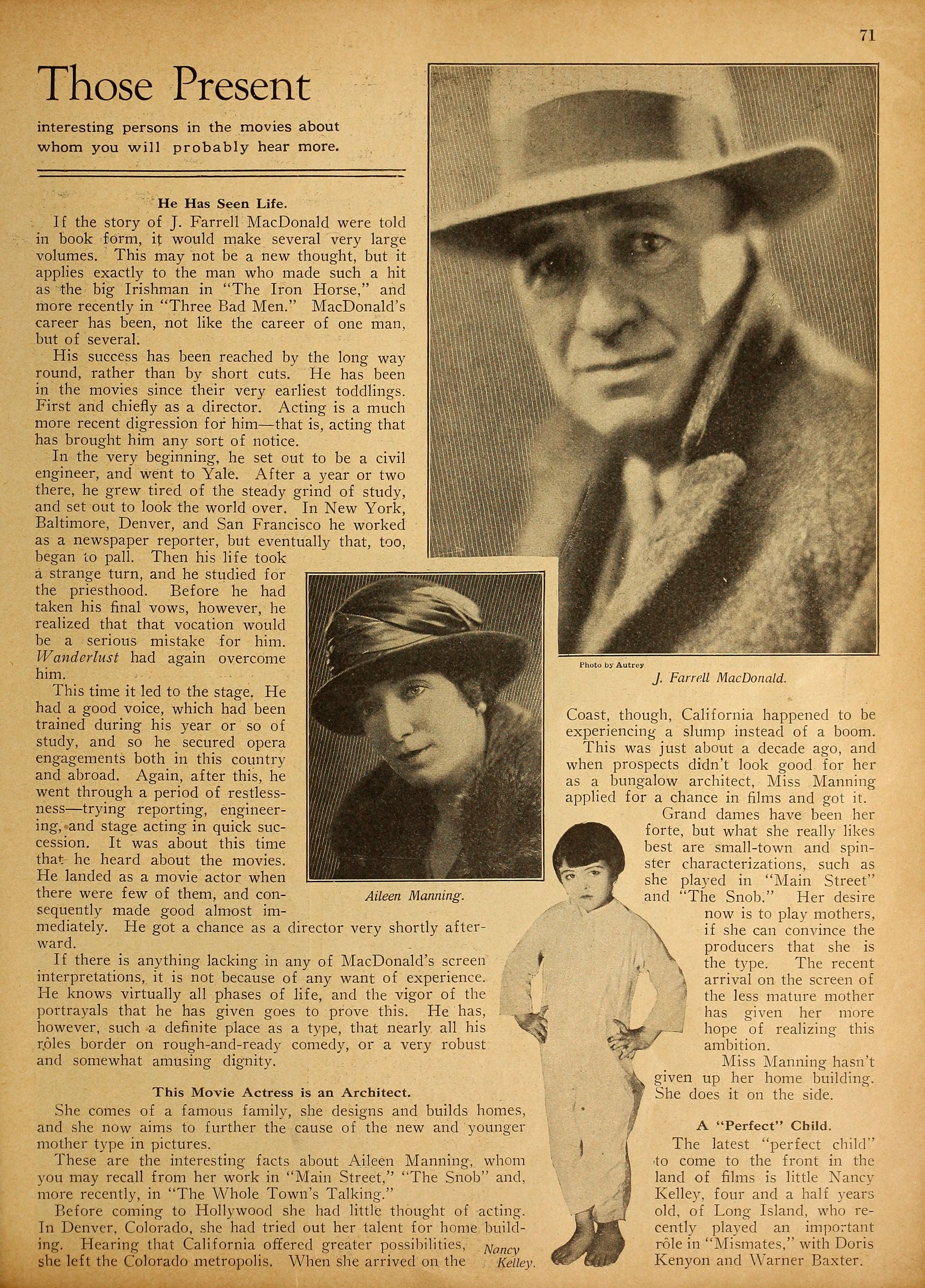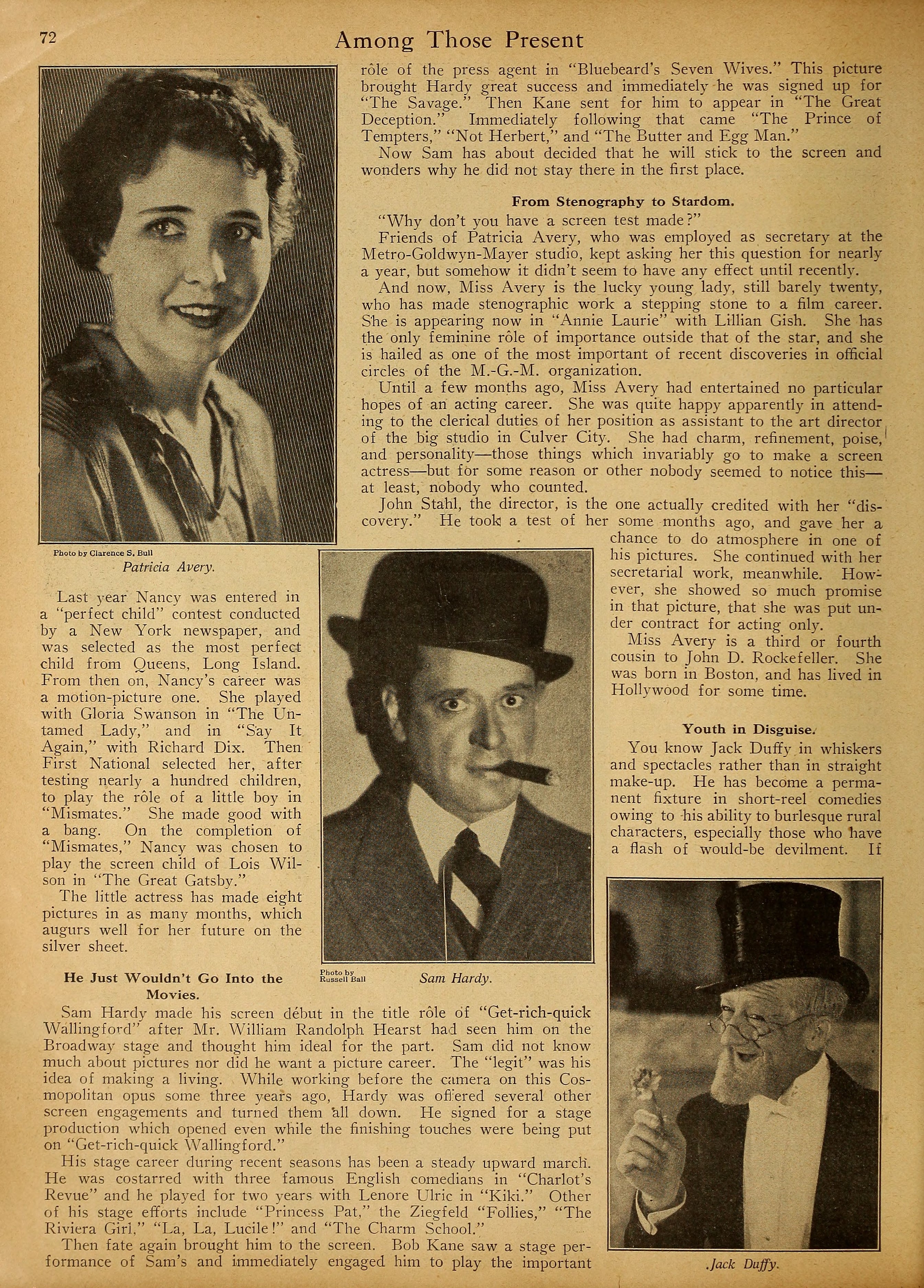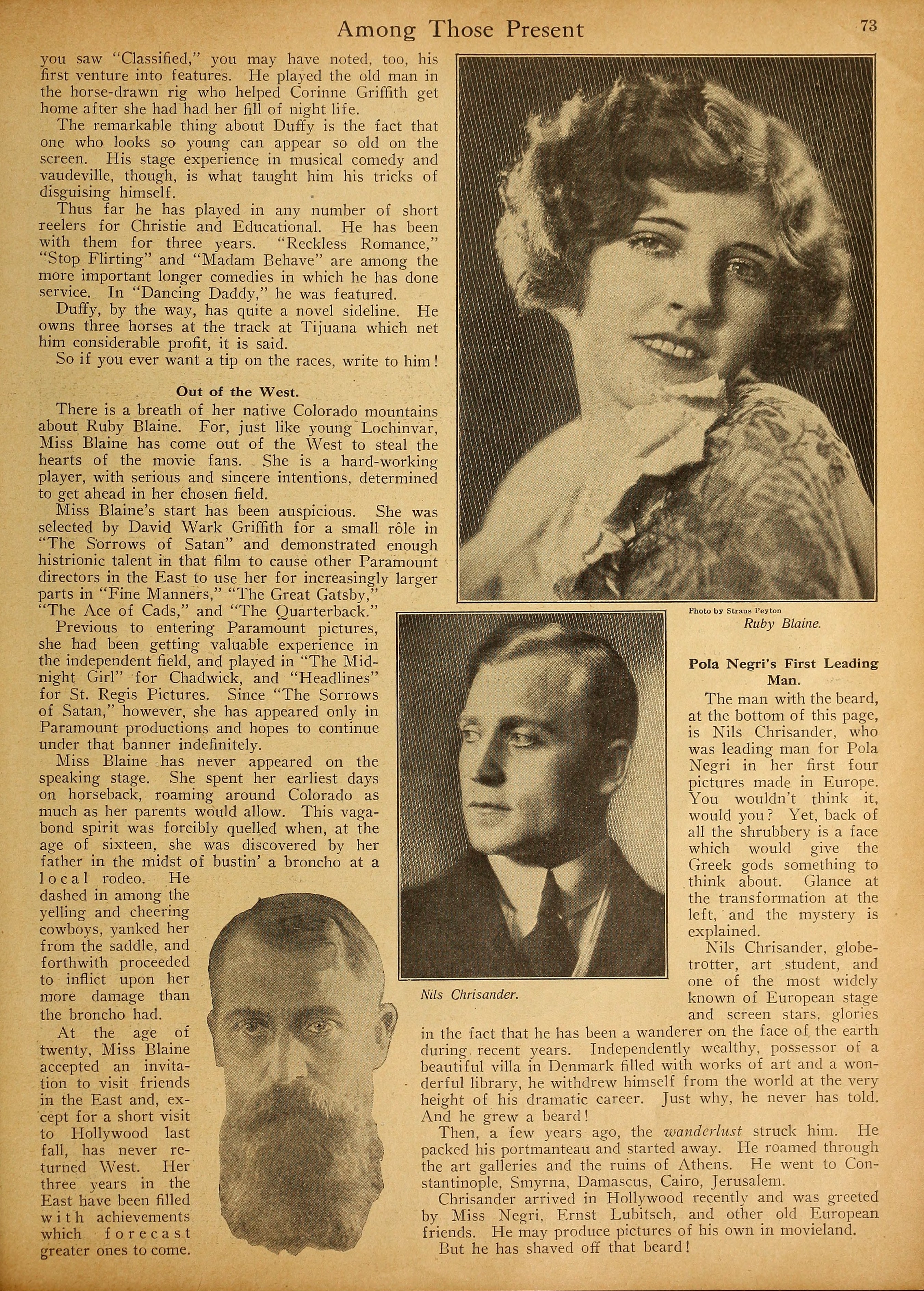Among Those Present (1927) 🇺🇸

Gloria Gordon — At Last She Beat the Jinx
Dark, slim, pretty, and eighteen — picked as potential star material by the man who gave Clara Bow, Alyce Mills, and others their first chance. That’s Gloria Gordon, who is being primed for featured roles by J. G. Bachmann, producer of Preferred Pictures. Her first appearance for him was in Dancing Days.
No spectacular coup of fortune has marked Gloria’s grasp on recognition. Rather her climb has been typical of the hard, slow process — of disappointments and setbacks. Two years ago, she played hooky from high school in Florida and joined a movie troupe for a day’s work. Disappointment No. 1 — the company proved to be a fraudulent organization to bait the screen-struck. It even attempted to exact pay from its casts instead of giving it! When Gloria discovered that there wasn’t even any negative in the camera’s magazine, she threatened to call in the police and thus rescued her deluded coworkers.
On a visit to her sister in Cleveland a few months later, she was in the elevator of an office building when an artist who was drawing a series of illustrations for the novel, The Flapper Wife, spoke to her and asked her to pose for him. The story was eventually sold for the screen and little Miss Gordon found a contract in her hand to make a series of personal appearances with the showing of the film in vaudeville houses.
Hoping that this would prove a wedge toward her own entry into pictures, she came to New York, where she found continuous extra work, but nothing more. Although casting directors liked her, the big plums were for the better known. Successive visits to Mr. Bachmann’s office brought always the same response, that he was either “out” or “in conference.” Finally, one day, Gloria decided to wait until he came either “in” or “out of conference.” After a few hours, the producer stepped off the elevator and Gloria introduced herself. That was Friday, and Saturday she was signed, not as an extra, but as leading lady in The Romance of a Million Dollars, with Glenn Hunter.
But the jinx wasn’t broken yet. On her third day of work, a miscalculated leap from a moving automobile resulted in a sprained ankle, and Alyce Mills stepped into the lead.
But Mr. Bachmann comforted the disconsolate Gloria with promises of another chance as soon as she recovered. And he was as good as his word, for the billing on Dancing Days featured Gloria Gordon in large type.
—
Lucien Prival — Not Von Stroheim?
There’s a certain young man who has been acting out at the First National studio in New York who caused something of a stir when he first appeared there. His name is Lucien Prival, but you turn and look twice before you are sure that it isn’t Erich von Stroheim. He has the same closely clipped Teutonic head, the same worried look about the forehead and eyes, the same curl of the lips. And he has a leaning toward the same unpleasant type of roles.
You may have seen him in Puppets, or as the sneering German officer in The Great Deception. If not, look for him in Just Another Blonde.
He has crowded much into the short span of his twenty-five years. The child of a French father and a German mother, he was brought up in Germany, but broke away from home at an early age to go onto the stage. Aiming from the outset at morbid roles, he played in support of some of Germany’s best-known actors, until the war put a temporary halt to his promising career and, because of his father’s nationality, he was held as an enemy in Germany. It was after the armistice that he came to America.
A strange young man he is — “Abnormal or subnormal parts” is the way he describes the only roles in which he is interested.
—
J. Farrell MacDonald — He Has Seen Life
If the story of J. Farrell MacDonald were told in book form, it would make several very large volumes. This may not be a new thought, but it applies exactly to the man who made such a hit as the big Irishman in The Iron Horse, and more recently in Three Bad Men. MacDonald’s career has been, not like the career of one man, but of several.
His success has been reached by the long way round, rather than by short cuts. He has been in the movies since their very earliest toddlings. First and chiefly as a director. Acting is a much more recent digression for him — that is, acting that has brought him any sort of notice.
In the very beginning, he set out to be a civil engineer, and went to Yale. After a year or two there, he grew tired of the steady grind of study, and set out to look the world over. In New York, Baltimore, Denver, and San Francisco he worked as a newspaper reporter, but eventually that, too, began to pall. Then his life took a strange turn, and he studied for the priesthood. Before he had taken his final vows, however, he realized that that vocation would be a serious mistake for him. Wanderlust had again overcome him.
This time it led to the stage. He had a good voice, which had been trained during his year or so of study, and so he secured opera engagements both in this country and abroad. Again, after this, he went through a period of restlessness — trying reporting, engineering, and stage acting in quick succession. It was about this time that he heard about the movies. He landed as a movie actor when there were few of them, and consequently made good almost immediately. He got a chance as a director very shortly afterward.
If there is anything lacking in any of MacDonald’s screen interpretations, it is not because of any want of experience. He knows virtually all phases of life, and the vigor of the portrayals that he has given goes to prove this. He has, however, such a definite place as a type, that nearly all his roles border on rough-and-ready comedy, or a very robust and somewhat amusing dignity.
—
Aileen Manning — This Movie Actress is an Architect
She comes of a famous family, she designs and builds homes, and she now aims to further the cause of the new and younger mother type in pictures.
These are the interesting facts about Aileen Manning, whom you may recall from her work in Main Street, The Snob and, more recently, in The Whole Town’s Talking.
Before coming to Hollywood she had little thought of acting. In Denver, Colorado, she had tried out her talent for home building. Hearing that California offered greater possibilities, Nancy she left the Colorado metropolis. When she arrived on the Kelley Coast, though, California happened to be experiencing a slump instead of a boom.
This was just about a decade ago, and when prospects didn’t look good for her as a bungalow architect, Miss Manning applied for a chance in films and got it.
Grand dames have been her forte, but what she really likes best are small-town and spinster characterizations, such as she played in Main Street and The Snob. Her desire now is to play mothers,
If she can convince the producers that she is the type. The recent arrival on the screen of the less mature mother has given her more hope of realizing this ambition.
Miss Manning hasn’t given up her home building. She does it on the side.
—
Nancy Kelley — A “Perfect” Child
The latest “perfect child” to come to the front in the land of films is little Nancy Kelley, four and a half years old, of Long Island, who recently played an important role in “Mismates,” with Doris Kenyon and Warner Baxter.
Last year Nancy was entered in a “perfect child” contest conducted by a New York newspaper, and was selected as the most perfect child from Queens, Long Island. From then on, Nancy’s career was a motion-picture one. She played with Gloria Swanson in “The Untamed Lady,” and in “Say It Again,” with Richard Dix. Then First National selected her, after testing nearly a hundred children, to play the role of a little boy in Mismates. She made good with a bang. On the completion of Mismates, Nancy was chosen to play the screen child of Lois Wilson in “The Great Gatsby.”
The little actress has made eight pictures in as many months, which augurs well for her future on the silver sheet.
—
Sam Hardy — He Just Wouldn’t Go into the Movies
Sam Hardy made his screen debut in the title role of Get-Rich-Quick Wallingford after Mr. William Randolph Hearst had seen him on the Broadway stage and thought him ideal for the part. Sam did not know much about pictures nor did he want a picture career. The “legit” was his idea of making a living. While working before the camera on this Cosmopolitan opus some three years ago, Hardy was offered several other screen engagements and turned them ‘all down. He signed for a stage production which opened even while the finishing touches were being put on Get-Rich-Quick Wallingford.
His stage career during recent seasons has been a steady upward march. He was co-starred with three famous English comedians in Chariot’s Revue and he played for two years with Lenore Ulric in Kiki. Other of his stage efforts include Princess Pat, the Ziegfeld Follies, The Riviera Girl, La, La, Lucile! and The Charm School.
Then fate again brought him to the screen. Bob Kane saw a stage performance of Sam’s and immediately engaged him to play the important role of the press agent in “Bluebeard’s Seven Wives.” This picture brought Hardy great success and immediately he was signed up for “The Savage.” Then Kane sent for him to appear in “The Great Deception.” Immediately following that came The Prince of Tempters, “Not Herbert,” and “The Butter and Egg Man.”
Now Sam has about decided that he will stick to the screen and wonders why he did not stay there in the first place.
—
Patricia Avery — From Stenography to Stardom
“Why don’t you have a screen test made?”
Friends of Patricia Avery, who was employed as secretary at the Metro-Goldwyn-Mayer studio, kept asking her this question for nearly a year, but somehow it didn’t seem to have any effect until recently.
And now, Miss Avery is the lucky young lady, still barely twenty, who has made stenographic work a stepping stone to a film career. She is appearing now in Annie Laurie with Lillian Gish. She has the only feminine role of importance outside that of the star, and she is hailed as one of the most important of recent discoveries in official circles of the M.-G.-M. organization.
Until a few months ago, Miss Avery had entertained no particular hopes of an acting career. She was quite happy apparently in attending to the clerical duties of her position as assistant to the art director of the big studio in Culver City. She had charm, refinement, poise,’ and personality — those things which invariably go to make a screen actress — but for some reason or other nobody seemed to notice this — at least, nobody who counted.
John Stahl [John M. Stahl], the director, is the one actually credited with her “discovery.” He took a test of her some months ago, and gave her a chance to do atmosphere in one of his pictures. She continued with her secretarial work, meanwhile. However, she showed so much promise in that picture, that she was put under contract for acting only.
Miss Avery is a third or fourth cousin to John D. Rockefeller. She was born in Boston, and has lived in Hollywood for some time.
—
Jack Duffy — Youth in Disguise
You know Jack Duffy in whiskers and spectacles rather than in straight make-up. He has become a permanent fixture in short-reel comedies owing to his ability to burlesque rural characters, especially those who have a flash of would-be devilment. If you saw “Classified,” you may have noted, too, his first venture into features. He played the old man in the horse-drawn rig who helped Corinne Griffith get home after she had had her fill of night life.
The remarkable thing about Duffy is the fact that one who looks so young can appear so old on the screen. His stage experience in musical comedy and vaudeville, though, is what taught him his tricks of disguising himself.
Thus far he has played in any number of short reelers for Christie [Al Christie] and Educational. He has been with them for three years. “Reckless Romance,” “Stop Flirting” and “Madam Behave” are among the more important longer comedies in which he has done service. In “Dancing Daddy,” he was featured.
Duffy, by the way, has quite a novel sideline. He owns three horses at the track at Tijuana which net him considerable profit, it is said.
So if you ever want a tip on the races, write to him!
—
Ruby Blaine — Out of the West
There is a breath of her native Colorado mountains about Ruby Blaine. For, just like young Lochinvar, Miss Blaine has come out of the West to steal the hearts of the movie fans. She is a hard-working player, with serious and sincere intentions, determined to get ahead in her chosen field.
Miss Blaine’s start has been auspicious. She was selected by David Wark Griffith for a small role in The Sorrows of Satan and demonstrated enough histrionic talent in that film to cause other Paramount directors in the East to use her for increasingly larger parts in “Fine Manners,” “The Great Gatsby,” “The Ace of Cads,” and “The Quarterback.”
Previous to entering Paramount pictures, she had been getting valuable experience in the independent field, and played in “The Midnight Girl” for Chadwick, and “Headlines” for St. Regis Pictures. Since The Sorrows of Satan, however, she has appeared only in Paramount productions and hopes to continue under that banner indefinitely.
Miss Blaine has never appeared on the speaking stage. She spent her earliest days on horseback, roaming around Colorado as much as her parents would allow. This vagabond spirit was forcibly quelled when, at the age of sixteen, she was discovered by her father in the midst of bustin’ a broncho at a local rodeo. He dashed in among the yelling and cheering cowboys, yanked her from the saddle, and forthwith proceeded to inflict upon her more damage than the broncho had.
At the age of twenty. Miss Blaine accepted an invitation to visit friends in the East and, except for a short visit to Hollywood last fall, has never returned West. Her three years in the East have been filled with achievements which forecast greater ones to come.
—
Nils Chrisander — Pola Negri’s First Leading Man
The man with the beard, at the bottom of this page, is Nils Chrisander, who was leading man for Pola Negri in her first four pictures made in Europe. You wouldn’t think it, would you? Yet, back of all the shrubbery is a face which would give the Greek gods something to think about. Glance at the transformation at the left, and the mystery is explained.
Nils Chrisander, globetrotter, art student, and one of the most widely known of European stage and screen stars, glories in the fact that he has been a wanderer on the face of the earth during, recent years. Independently wealthy, possessor of a beautiful villa in Denmark filled with works of art and a wonderful library, he withdrew himself from the world at the very height of his dramatic career. Just why, he never has told. And he grew a beard!
Then, a few years ago, the wanderlust struck him. He packed his portmanteau and started away. He roamed through the art galleries and the ruins of Athens. He went to Constantinople, Smyrna, Damascus, Cairo, Jerusalem.
Chrisander arrived in Hollywood recently and was greeted by Miss Negri, Ernst Lubitsch, and other old European friends. He may produce pictures of his own in movieland. But he has shaved off that beard!

Gloria Gordon — Photo by: Apeda Studio

J. Farrell MacDonald — Photo by: Max Munn Autrey (1891–1971)

Patricia Avery — Photo by: Clarence Sinclair Bull (1896–1979)
Sam Hardy — Photo by: Russell Ball (1891–1942)

Ruby Blaine — Strauss Peyton Studio
Collection: Picture Play Magazine, January 1927
